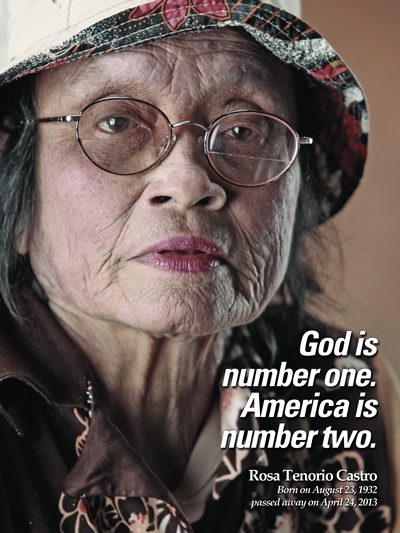 My name is Rosa Tenorio Castro. My date of birth and place of birth was August 23, 1932 at Agana, Guam. The place of my residence in 1941 to '44 was Chalan Pago, Guam on a thatched-roof ranch.
My name is Rosa Tenorio Castro. My date of birth and place of birth was August 23, 1932 at Agana, Guam. The place of my residence in 1941 to '44 was Chalan Pago, Guam on a thatched-roof ranch.
My brother, Ignacio was beaten by the Japanese and died. My whole family was forced to march to Manenggon. Mother was sickly and finally she died. Her name is Maria Tenorio Castro.
If I did not march, they will kill me. Also, they will make me work in hot sun with no food and water and even though it's raining or not raining. It's a forced labor for a child. You don't have any democracy. There's no say so, "I beg your pardon." "Do it or else the end it be of you." In other words, they were very cruel to us Chamorros. We were forced to march to Manenggon. The Japanese will kill my whole family if we did not. Whole family and my clan is very big. The Castros and the Tenorios, Blas and Iglesias. If we didn't do it, then, my whole clan will go.
We did not have right over any of our property or farm, especially we were only living by farm. They took privilege from us because everything that we own, our land, our food, water, we didn't own anything. It all belongs to the Emperor of Japan or the Japanese. Even if you have a pig and we like to raise that pig and multiply, or chicken, we cannot do it because the Japanese would hit us.
There's nothing in our hand that we can say is ours. When you're going to eat something like that, killing chicken or killing pig, it looks like we were doing an act of stealing. When the Japanese were sleeping, because we were living in the ranch and you kill the pig and then go and then eat as much as you can because the next time you won't find it. That's cruelty under a food law.
December 8, 1941 is a Holy Day of obligation. Everyone was supposed to go to church. That's our Catholic. What happened at the time when Sumay and Piti were under bombardment, the Bishop received a note "Please release the people because the Piti Power Plant is already under bombardment by the Japanese."
So what happened, the Bishop told the people to go home, leave Agana and go somewhere to hide. I will finish the mass, the Catholic mass. So, everybody went crazy. So, what happened? We went to our ranch over there near Sinajana. So we stayed there for quite a while.
Then, all of my other relatives tried to accommodate themselves under a little ranch thatched-house. We call it guma' is house, lancho is ranch. So, we call it our guma', our house, even though it's only a thatch roof. Then what happened? We stayed there and the Japanese, 1941, '42, '43, '44.
I was tired and yet I was forced to go to Japanese school. I didn't know how to speak Japanese. I remember the sensei was saying that and it's true, before you enter the building of any building on the Japanese line, take your shoes off. You better take it off. If you don't take it off, something will happen to you. Sure enough. I'm not so used to taking my shoes off before going into the Japanese school. I did not.
Boy, you know what happened. I got something else. I’m lucky that they didn't kill me. But, the Japanese people disagree with that because ...
After that, we stopped the school because the Americans were coming. So, we went back to our ranch and left Sinajana and we went to Chalan Pago. From there on, we went to Manenggon. Then, the marching on Manenggon, I thought, being a child, my understanding is only a child's understanding. But, now it's not. It's the opposite way around. What I heard as a child, that we were going to go to Manenggon, where there’s a camp to be preserved from the American bombing.
But, that is not true. They put us there so that the Japanese collect the Chamorro and give a big bomb. One bomb is enough for many people. That's what they intended to do, but God did not permit them to do it because the American came in 1944, July 21. So, we were still in hot rod.
So, at least I live to see that. I am very glad to the American people. In fact, as a child, you pick up words here and there. We made up a song, "Uncle Sam". You heard that. So, to me, God is number one, America is number two. The American people and the Chamorros we are just national at the time.
But, we are so, I consider myself an American too. But, my blood is not American. But, I consider myself because I'm American citizen, I believe in God and I believe in the American democracy forever.
Real People. Real Stories. A weekly testimonial series provided by the Office of Senator Frank F. Blas, Jr. The testimony of Rosa Tenorio Castro, is recorded in the Guam War Claims Review Commission public hearing held in Hagåtña, Guam on December 9, 2003. This story sponsored by the community involvement of Unity Development Corporation. Photo courtesy of Expressions Studio.
 |

